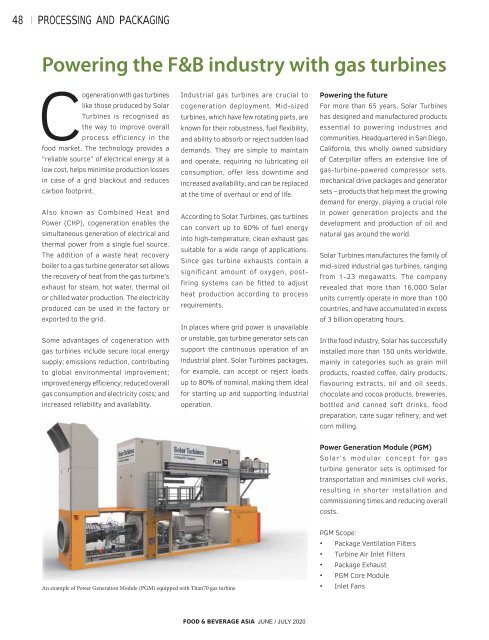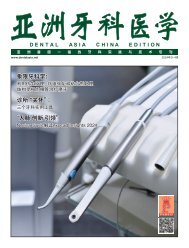Food & Beverage Asia June/July 2020
Food & Beverage Asia (FBA) is the leading source of food and beverage news in Asia since 2002. FBA delivers a comprehensive view of the food and beverage landscape, spanning across the latest health and nutrition trends and industry innovations in ingredients, recipe formulations, food science, sustainability, packaging, and automation, as well as advancements in agri and food-tech.
Food & Beverage Asia (FBA) is the leading source of food and beverage news in Asia since 2002. FBA delivers a comprehensive view of the food and beverage landscape, spanning across the latest health and nutrition trends and industry innovations in ingredients, recipe formulations, food science, sustainability, packaging, and automation, as well as advancements in agri and food-tech.
You also want an ePaper? Increase the reach of your titles
YUMPU automatically turns print PDFs into web optimized ePapers that Google loves.
48<br />
PROCESSING AND PACKAGING<br />
Powering the F&B industry with gas turbines<br />
Cogeneration with gas turbines<br />
like those produced by Solar<br />
Turbines is recognised as<br />
the way to improve overall<br />
process efficiency in the<br />
food market. The technology provides a<br />
“reliable source” of electrical energy at a<br />
low cost, helps minimise production losses<br />
in case of a grid blackout and reduces<br />
carbon footprint.<br />
Also known as Combined Heat and<br />
Power (CHP), cogeneration enables the<br />
simultaneous generation of electrical and<br />
thermal power from a single fuel source.<br />
The addition of a waste heat recovery<br />
boiler to a gas turbine generator set allows<br />
the recovery of heat from the gas turbine’s<br />
exhaust for steam, hot water, thermal oil<br />
or chilled water production. The electricity<br />
produced can be used in the factory or<br />
exported to the grid.<br />
Some advantages of cogeneration with<br />
gas turbines include secure local energy<br />
supply; emissions reduction, contributing<br />
to global environmental improvement;<br />
improved energy efficiency; reduced overall<br />
gas consumption and electricity costs; and<br />
increased reliability and availability.<br />
Industrial gas turbines are crucial to<br />
cogeneration deployment. Mid-sized<br />
turbines, which have few rotating parts, are<br />
known for their robustness, fuel flexibility,<br />
and ability to absorb or reject sudden load<br />
demands. They are simple to maintain<br />
and operate, requiring no lubricating oil<br />
consumption, offer less downtime and<br />
increased availability, and can be replaced<br />
at the time of overhaul or end of life.<br />
According to Solar Turbines, gas turbines<br />
can convert up to 60% of fuel energy<br />
into high-temperature, clean exhaust gas<br />
suitable for a wide range of applications.<br />
Since gas turbine exhausts contain a<br />
significant amount of oxygen, postfiring<br />
systems can be fitted to adjust<br />
heat production according to process<br />
requirements.<br />
In places where grid power is unavailable<br />
or unstable, gas turbine generator sets can<br />
support the continuous operation of an<br />
industrial plant. Solar Turbines packages,<br />
for example, can accept or reject loads<br />
up to 80% of nominal, making them ideal<br />
for starting up and supporting industrial<br />
operation.<br />
Powering the future<br />
For more than 65 years, Solar Turbines<br />
has designed and manufactured products<br />
essential to powering industries and<br />
communities. Headquartered in San Diego,<br />
California, this wholly owned subsidiary<br />
of Caterpillar offers an extensive line of<br />
gas-turbine-powered compressor sets,<br />
mechanical drive packages and generator<br />
sets – products that help meet the growing<br />
demand for energy, playing a crucial role<br />
in power generation projects and the<br />
development and production of oil and<br />
natural gas around the world.<br />
Solar Turbines manufactures the family of<br />
mid-sized industrial gas turbines, ranging<br />
from 1-23 megawatts. The company<br />
revealed that more than 16,000 Solar<br />
units currently operate in more than 100<br />
countries, and have accumulated in excess<br />
of 3 billion operating hours.<br />
In the food industry, Solar has successfully<br />
installed more than 150 units worldwide,<br />
mainly in categories such as grain mill<br />
products, roasted coffee, dairy products,<br />
flavouring extracts, oil and oil seeds,<br />
chocolate and cocoa products, breweries,<br />
bottled and canned soft drinks, food<br />
preparation, cane sugar refinery, and wet<br />
corn milling.<br />
Power Generation Module (PGM)<br />
Solar’s modular concept for gas<br />
turbine generator sets is optimised for<br />
transportation and minimises civil works,<br />
resulting in shorter installation and<br />
commissioning times and reducing overall<br />
costs.<br />
An example of Power Generation Module (PGM) equipped with Titan70 gas turbine<br />
PGM Scope:<br />
• Package Ventilation Filters<br />
• Turbine Air Inlet Filters<br />
• Package Exhaust<br />
• PGM Core Module<br />
• Inlet Fans<br />
FOOD & BEVERAGE ASIA JUNE / JULY <strong>2020</strong>


















